| Srl | Item |
| 1 |
ID:
074444
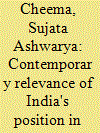

|
|
|
| 2 |
ID:
175461
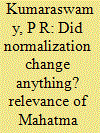

|
|
|
|
|
| Summary/Abstract |
Mahatma Gandhi’s 1938 statement that ‘Palestine belongs to the Arabs’ has not lost its relevance even after India reversed its four-decade-old policy of recognition-without-relations and normalised relations with Israel in January 1992. Critics see growing Indo-Israeli relations as an abandonment of Gandhian values while supporters use the 1938 statement to reiterate India’s continued support for the Palestinians.
|
|
|
|
|
|
|
|
|
|
|
|
|
|
|
|
| 3 |
ID:
127935
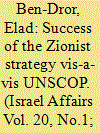

|
|
|
|
|
| Publication |
2014.
|
| Summary/Abstract |
The article examines the successful political strategies employed by Zionist diplomacy in the summer of 1947 vis-à-vis UNSCOP (the United Nations Special Committee on Palestine). The committee's recommendation of partition and the creation of a Jewish state on the majority of the territory between the Mediterranean and the Jordan River served as the basis for the UN partition resolution of 29 November 1947.The Zionist leaders made UNSCOP aware of their willingness to accept partition, but conditioned this on enlarging the territory of the future state. In this regard, the climax of their campaign, recounted in the article, was a secret and informal meeting between the senior echelons of the Jewish Agency and most members of UNSCOP on 14 July, an event that has been missed by historical research. The article describes the crucial influence of the Zionist message when UNSCOP came to formulate its conclusions and contributes to a better understanding of the process that led UNSCOP to its final recommendations.
|
|
|
|
|
|
|
|
|
|
|
|
|
|
|
|
| 4 |
ID:
175752
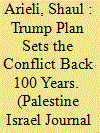

|
|
|
|
|
| Summary/Abstract |
It took 71 years for the Palestinian national movement to join the international community by recognizing the latter’s decisions. It took Israel 15 years to accept the United Nations’ decisions as a basis for a resolution of the conflict with the Palestinians. Yet it took only four years for the Israeli government, headed by Prime Minister Binyamin Netanyahu and with the backing of U.S. President Donald J. Trump, to backtrack from this. The “Deal of the Century” sets the conflict back 100 years.
|
|
|
|
|
|
|
|
|
|
|
|
|
|
|
|
| 5 |
ID:
126325
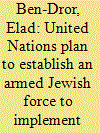

|
|
|
|
|
| Publication |
2013.
|
| Summary/Abstract |
On 29 November 1947, the United Nations General Assembly voted to partition Palestine into two independent states, Jewish and Arab, with Jerusalem as a corpus separatum under international control. The General Assembly then established the United Nations Palestine Commission to implement partition. Amongst other things, the Commission was to establish "armed militias" under UN supervision to help realise the plan. The analysis examines various aspects of the sequence of events related to this idea, from its conception in the General Assembly to its death in February 1948. It demonstrates that under the militia clause, the United Nations intended to rely on the Jews' main military organisation - the Haganah - to establish the Jewish state and shows how and why this plan went awry despite the converging interests of the Jews and the United Nations.
|
|
|
|
|
|
|
|
|
|
|
|
|
|
|
|